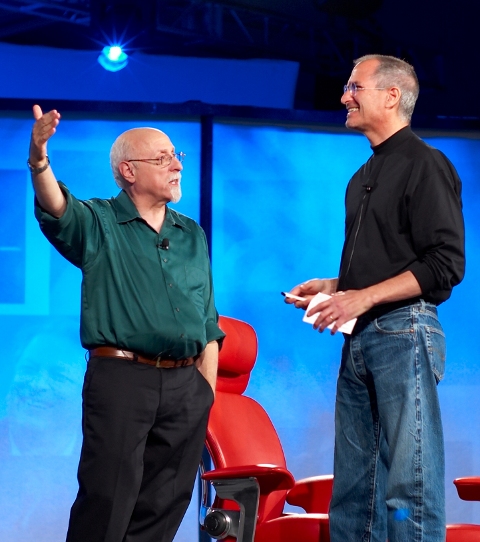

Mossberg loves dancing with the stars and he was on the Charlie Rose
show praising Jobs' questionable creation (photo by Joi)
Apple relies on a certain dosage of fake hype. It's like those AstroTurfers of Microsoft whose job is similar to audience managers (or 'plants' or extras) in comedy-filming studios where they stimulate laughs among the crowd. We wrote about that around yesterday or the day before that (depends on time zones) and HypePad too was a good example of hype generation through selective gifting.
And, more recently, there were some concerns over the NY Times' lack of disclosure concerning its relationship with Apple when reporting on the iPad.
Dan Gillmor shares these concerns, but notes an even more concrete conflict of interest — Apple’s advertising of the iPad consistently features a screenshot of the New York Times app, including of course the Times’ logo. Although Apple no doubt hopes to show that its device can be used to read the Times, surely attractive content to many of its target consumers, the image is also terrific advertising for the New York Times. Gillmor indicates that he has no doubt that Times’ reviewers truly believe the contents of their swooning coverage of the iPad, but argues that the benefit that the Times is receiving is a conflict of interest that ought to be overtly acknowledged and discussed by Times management. Yet, he reports, nobody from the Times has been willing to respond to his questions about the issue, such as whether the Times has received any compensation for the display of its logo on the iPad as shown in the ads. Gillmor raised these concerns a week ago, and the Times has yet to address publicly the possible conflict.
On the one hand, I commend Microsoft for using company blogs as marketing tools and for doing some aggressive evangelism around Windows 7 products. Microsoft critics are quick to wave the monopoly flag -- arguing that Windows sales are automatic. Oh yeah? Then explain the Windows Vista fiasco in terms of monopoly might. The majority of Windows XP users stayed put. Now their PCs creak at the bones and it's time for some fresh Windows 7 blood. Given the large number of Windows XP users who should be easy Windows 7 upgrades -- at least according to the monopoly might theory -- Microsoft should be able to sit back and collect the license fees. Instead, Microsoft is marketing the hell out of Windows 7, which is evidence enough that monopoly has more limited benefits than critics admit.
[...]
But that was decades ago. Today, Microsoft engages enthusiasts from its Websites and by using social networking and sharing tools. The approach is good, but larger Microsoft brand and product problems hamper the work. Enthusiasts are any company's best evangelists. Microsoft's number has dwindled over the years, while Apple's numbers increased -- at least as measured by the volume hype. Noise about Apple is so much louder than for Microsoft.